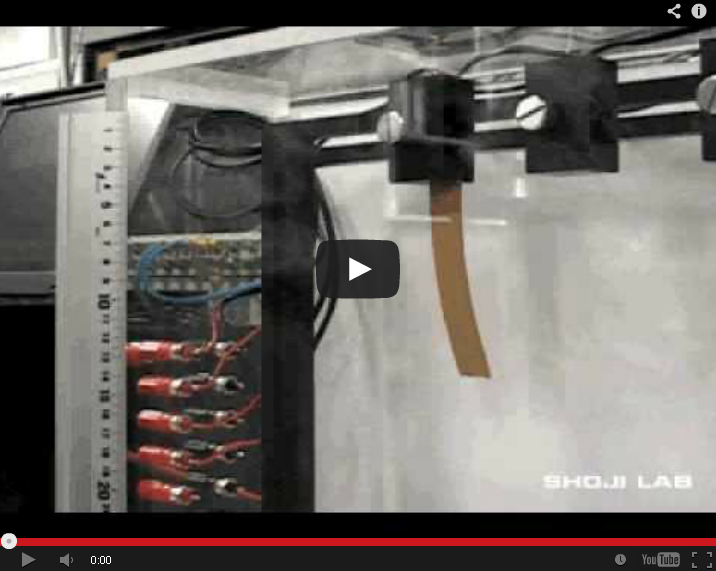Research
Advanced Intelligence
Nonlinear Science Laboratory
- Hiroki Takada Professor
- Yuki Sato Assistant Professor
As a fundamental science for human and artificial intelligent systems, we focuse on the nonlinear science which is known as a new paradigm in physics.
Biosignaling Laboratory
- Tatsuya Asai Associate Professor
We study brain activity using glucose imaging and calcium imaging techniques. Currently, we are investigating the neuroprotective effect against environmental stress.
Computational Intelligence Laboratory
- Jousuke Kuroiwa Professor
- Yuya Matsuda Assistant Professor
In our laboratory, we investigate mechanisms about intelligent systems based on physical and mathematical methods, and develop them.
Human Learning System Laboratory

- Masazumi Katayama Associate Professor
Our research objective is to understand cognition, action and its learning mechanism in the human brain that realizes a highly-developed information processing.
Laboratory Name: Radiation Medical Informatics and Intelligent Engineering Laboratory
- Yoshikazu Maeda Professor
In this laboratory, we conduct medical physical research to practice cancer radiation therapy with safer and more effectiveness by developing AI and machine learning technologies based on medical information accumulated in medical institutions. In collaboration with medical institutions, medical image information, biological information, and treatment prognostic follow up data are utilized to develop the assistance system for cancer imaging, treatment planning, and determining treatment protocol by predicting treatment effects and side effects. Through this kind of research, we will develop human resource education that can practice medical engineering collaboration.
Laboratory Name: Digital Twin Laboratory
- Ken Nakae Associate Professor
Building on insights from neuroscience, we create life that lives in digital space, and through constructing digital twins for life, we advance research that benefits society and local communities.
Advanced Informatics and Machinery
Human Interface Laboratory
- Yasuhiro Ogoshi Professor
Our laboratory conducts research on assistive technologies for people with disabilities. We comprehensively analyse big data such as behavioural information obtained from sensors installed in living spaces, learning information during social skills training and biometric information when solving psychological tasks. We then estimate the cognitive and behavioural characteristics of the people to be supported, and use artificial intelligence to derive suitable support plans.
Intelligence Modeling Laboratory
- Tomohiro Odaka Professor
We observe the complex human intellectual activities, and try to construct models of the intelligence. We also use the models of human intelligence to explore ways to make computers smarter.
Robotics Laboratory
- Tomohide Naniwa Professor
The technology called “control” is responsible for connecting the robot’s brain and body. Robotic manipulators and robotic hands that mimic human arms and hands are governed by nonlinear dynamics strongly influenced by nonlinear forces such as centrifugal force. We are working on the development of intelligent control technology with learning and adaptive functions.
Interactive Robotics Laboratory
- Yasutake Takahashi Professor
- Satoki Tsuichihara Senior Assistant Professor
Regarding the interaction between humans and environments and robots, we focus on behavioral learning, development, and evolution of robots, as well as emergence and imitation learning of cooperative behavior, achieving “human symbiosis systems” that can coexist and utilize with humans.
Advanced Materials Innovation Monozukuri Laboratory
- Eiichi Shoji Associate Professor
We are working to create unique technologies in several domains. For example, we are developing (a) advanced functional materials and nanomaterials in materials science and (b) polymer actuators (also referred to as artificial muscles) in energy-related chemistry. In the field of music information engineering, we are developing (c) the MUSICROBOT as a percussion instrument performance system for inclusive human and robot contribution in music. Furthermore, we are developing (d) a system that assists disabled people in joining music ensembles, called “BarrierFreeMusic.” Moreover, we are developing (e) nonpowered-radios of HOOPRA (Hoop-shaped Radios) in the field of communication engineering, (f) radio wave generators in the field of energy harvesting engineering for harvesting broadcasting radio waves, and (g) a system to protect cities from heavy rains and flooding via innovative “Tanbo Dam” in the field of smart agriculture.
Intelligent Robot Laboratory
- Kanji Tanaka Associate Professor
The primary focus of our research is robot vision. We conduct research on artificial intelligence and computer science for robots to visually recognize themselves and their surroundings using artificial eyes.
Innovative Optical Measurement System Laboratory
- Motoharu Fujigaki Professor
In our laboratory, we are researching and developing innovative optical measurement systems as future robot sensing technology. We are creating new methods and proposing novel optical measurement systems. We are trying to develop the world’s fastest, most accurate, and most useful 3D shape measurement and displacement/strain distribution measurement of structures systems using optical method and image analysis. Furthermore, we are applying them to intelligent and easy-to-use measurement systems and inspection robots, etc. Our research outcomes are widely used in society, including robotics fields, experimental mechanics fields, non-destructive testing fields, infrastructure sensing fields, civil engineering fields, factory automation fields, aerospace, medical and apparel fields.

